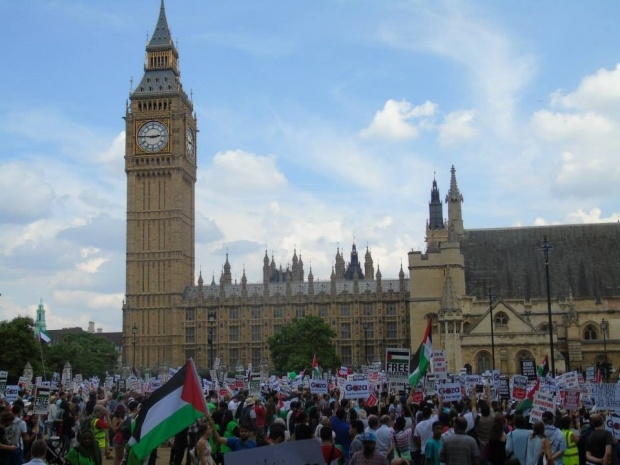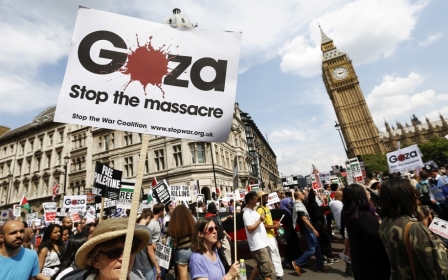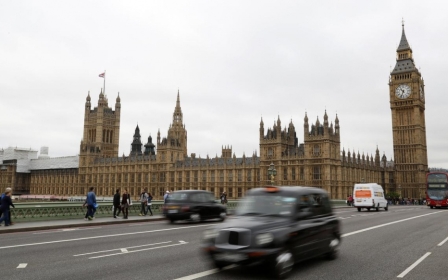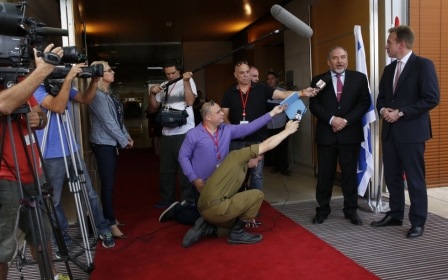UK Parliament passes motion calling on Britain to recognise Palestine

In the early spring I sat with Labour MP Graham Morris and Sir Vincent Fean, the former British Consul-General in Jerusalem, contemplating the possibility of even getting a backbench motion to recognise Palestine on to the floor of the House of Commons.
After two decades of lobbying for Palestinian rights in Parliament, it genuinely felt a distant prospect. In all that time there had not been a vote before the whole house on Palestine. Would the mother of all Parliaments stand up and deliver this small but symbolic step? At 10:15 on Monday night, 13 October 2014, Morris’s motion was passed in an historic vote by a thumping majority of 274 to just 12.
Even among the most optimistic Palestinian supporters this scale was not thought possible. Up to the last moment, many refused to believe the motion would even pass. For all the exaggerated talk of a powerful Israel lobby it could only muster a dirty dozen to oppose, even when the Israeli embassy was furiously lobbying against it. Perhaps it will burst the mythological aura of power that too many attach to it.
It was a compelling debate with many of the anti-Palestinian speakers struggling to justify their opposition to Britain recognising Palestinian rights. Many opponents of the motion actually ducked the whole debate, an age-old tactic to try to minimise its impact by having as few a number of MPs present as possible. The reality is that it is deeply uncomfortable, even for some of the most ardent opponents of Palestine, to argue publicly against recognising these national rights.
Does it matter? Time will tell.
The former Foreign Secretary Jack Straw swiftly knocked back an intervention that this was a futile vote with the riposte: “We represent the people of Britain. If this motion goes through it will make a difference." I took Jack to Palestine in December 2013 and it is fair to say he was shocked and appalled at the injustices he saw. One other senior member of the current shadow Labour cabinet said during a visit: “I do not see the second state we have been talking about.” Many others like them have also seen the reality on the ground and will not be put off from pushing the government further on this and other issues. Many senior Tories also pushed for recognition. Alan Duncan and Hugh Robertson, both recent Conservative ex-ministers, supported the motion. Duncan is also about to make a major speech on 14 October urging serious actions on settlements.
All this could be the wake-up-call to force the current government or a future government to join the other 138 states that have recognised Palestine. Together with Sweden - which said it would recognise Palestine earlier this month - Britain could for once lead in Europe and blast a trail for other EU states to follow. Some argued that the vote would not make any difference so why vote for the motion? Anti-Palestinian groups and Israeli government spokespeople argue that this motion will hit chances for peace hard and set back the negotiating process. This carries little weight when there is no negotiating process to damage.
The British government probably will not change its position right now. It will not want to be seen to cave into pressure. It may be willing though to entertain a more European wide move.
Moreover, in May 2015 there are general elections whose outcome is far from certain. Would a Labour led-government recognise Palestine? It would seem so.
But also, Israel should take careful note. Despite all its protestations to the contrary, it has been living in the diplomatic comfort zone for decades shielded by the US and other allies. But its friends are declining both in number and enthusiasm. The speech of Sir Richard Ottoway, the Chair of the Foreign Affairs Select Committee was telling. He has, by his own admission, been a life-long supporter of Israel, yet the recent settlement land grab made him extremely angry. “The annexation of the 950 acres of the West Bank just a few months ago has outraged me more than anything else in my political life, mainly because it makes me look a fool, and that is something that I resent […] I have to say to the Government of Israel that if they are losing people like me, they will be losing a lot of people.”
Yet Palestine is still a state under occupation. Its President cannot leave Ramallah without Israeli permission. Israel controls the borders, the land and the water. It decides what goes in and out. Its settlement project is racing ahead oblivious to the international condemnations. Gaza is still under blockade and reeling from the 51-day devastation Israel wreaked upon it this summer, in addition to the three other wars since 2006. As Israeli spokesmen even argue, none of these votes for recognition will change the harsh reality on the ground.
It is, however, the direction of travel. Israel is losing nearly every major argument of importance to its government. Tensions with the White House have never been worse. Internationally it is Netanyahu and his cabinet colleagues who are seen as the obstacles to peace, not the Palestinian leadership. Just perhaps this will pierce his kevlar-coated ego and cause him to pause to think about the dangerous direction he is taking his country.
Slowly the international community may start to take some action to save the two-state solution it has invested in so much. This historic vote is a welcome first step but there really will be nothing left of Palestine to recognise if tougher, bolder international action against the Israeli occupation is not taken immediately.
Photo credit: An estimated 100,000 people protested in London against the latest Israeli assault on Gaza in August 2014 (Hanan Chehata/MEE)
New MEE newsletter: Jerusalem Dispatch
Sign up to get the latest insights and analysis on Israel-Palestine, alongside Turkey Unpacked and other MEE newsletters
Middle East Eye delivers independent and unrivalled coverage and analysis of the Middle East, North Africa and beyond. To learn more about republishing this content and the associated fees, please fill out this form. More about MEE can be found here.





